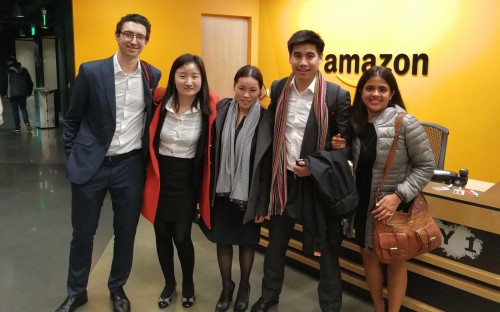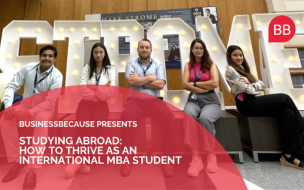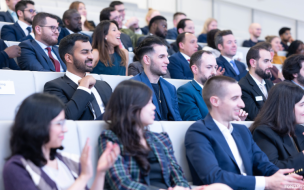HKUST has a strong focus on experiential learning through participation in case competitions. MBA students form their own teams and compete internationally, using their consulting skills to identify key trends in a chosen industry and solve a real-life issue faced by a real firm.
USC Marshall’s GCC consists of five weeks of preparation culminating in a two-day pitching competition, where MBA students pitch ideas to a panel of experts; seasoned investors and employers interested in hiring top MBA talent. This year’s sponsor company was Amazon.
The winning HKUST MBA team presented a B2B solution which would allow Amazon to tap into a new source of revenue while supporting its vision to become the most customer-centric company on earth. They beat off competition from global business schools like Johnson at Cornell, McGill, and MIT Sloan.
BusinessBecause caught up with winning team member Jessy Tam to find out more. Jessy, who relocated from Canada to join HKUST, chose the school for its diversity and intimate MBA class size – the HKUST MBA class typically consists of around 120 students, representing 30 nationalities. Jessy wants to leverage her knowledge of Asia in a healthcare consulting role after graduation.
How have you profited from your experience at the Global Consulting Challenge?
The most valuable thing I gained from the case competition was the bond with my teammates, who are all from different parts of the world. Although there was a lot of conflict and disagreement when we were cracking the case, in the end, we managed to incorporate everyone’s opinion in our final solution. We also leveraged on each member’s expertise and, on competition day, everyone performed their role. This takes a huge degree of maturity to achieve – on compromising and communicating – and I’m grateful to have gone on this journey.
Why are case competitions important?
Case competitions provide an opportunity for MBA students to link all the subjects they’ve learned – accounting, finance, marketing, and strategy – together, and apply their knowledge to a real-life business case. The practical application of business theory will help solidify the understandings of many business concepts and help students gain an edge in a real-life business environment.
Case competitions are also perfect platforms for MBA students to better understand team dynamics and hone their leadership skills – all crucial skillsets for cross-cultural leaders.
Why did you decide to pursue an MBA at HKUST?
‘Fit’ was a crucial part of my decision process. I wanted a program with an Asian focus. I’d heard that MBA programs are extremely intense and hectic, and in a large cohort setting you unfortunately don’t have the time to get to know everyone. So, I wanted a small, intimate program where I could forge close bonds with my classmates.
Diversity was another important factor, my classmates all come from different cultures and backgrounds, and the exchange in people's insights and perspectives is what makes HKUST stand out.
What are your career ambitions for the future?
I see incredible potential in the Asian healthcare market in the next decade. I am interested in a career in management consulting in the healthcare industry. My long-term goal is to do business development for healthcare startups based in the West and provide them with an Asian market insight. HKUST’s brand and reputation in Asia will allow me to have access to a professional network and industry in the region.
Student Reviews
HKUST Business School
RECAPTHA :
77
d8
6b
ca









